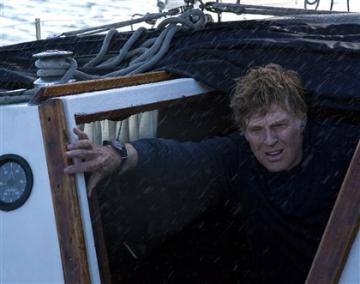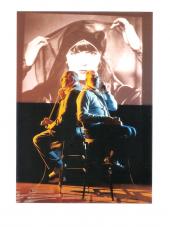`All Is Lost': A gripping tour de force for craggy Robert Redford
What do you do in---and with---your last hours, once despair turns to resignation? Or, for that matter, in your last big film role?
Neither Robert Redford nor his stellar career is yet ready for an obituary. Let’s just call it an overview: As an actor, he has always been competent if not brilliant, his performances marked by a certain guileless credibility. He rarely takes on a role that doesn’t match (or at least suit) his real person as well as his persona, both of which are basically unemotional. His screen magic---from “The Natural” and “Butch Cassidy” through “The Way We Were” and “All the President’s Men”---is that of an unemotional man who somehow gets audiences emotionally involved.
In that regard, “All Is Lost” is both the epitome and the ultimate role---an astonishing one-man-show in a gripping survival movie.
It opens with a vague voiceover of just a minute or two, establishing our nameless hero’s peril on the
In the middle of a solo voyage through the
The container is incongruously spitting out tennis shoes and other cheap Asian goods. He hooks up to it---like Ahab harpooned to Moby Dick---to stabilize his own little vessel while assessing the damage, inside and out. His navigation systems and radio are disabled. But this is not the kind of man who panics.
There’s lots to do: ropes to be knotted, winches to be winched, hatches to be battened. He salvages what little seawater-drenched equipment he can and, like a maritime plastic surgeon, does makeshift repairs to the skin of his craft. Hastily consults the “Celestial Navigation for Yachtsmen” manual that has lain untouched in his cabin drawer for years. In great shape for his age, he can still climb the mast but it’s all fairly slow and painful. Don’t lose your footing... Only so much physical and mental energy... SOS calls go unanswered as he drifts into the path of a rising storm... Keep calm, keep the routine... He cooks and shaves. But he’s forced to rely on ocean currents to carry him into a Sumatra Straits shipping lane in the faint hope of hailing a passing vessel. There’s a new crisis every hour. There’s the relentless sun, the circling sharks, the end of his food and water supply. The ever-resourceful sailor is at the end of his resources.
Writer-director J.C. Chandor (“Margin Call”) delivers a tense adventure with minimalist storytelling for 106 tight minutes---nothing gratuitous or extraneous. His camera spends much of its time at the waterline, dipping above and below it only for emphasis. The distressed yachtsman never talks to himself (or us) out loud, not even by interior monologue. The film is wordless, but hardly silent: Wind, water and the rumble of thunder were never so ominously articulate. As in O’Neill’s “Anna Christie,” “dat old devil sea!” has voices, noises and breathing patterns more complex than a human being’s.
As movies-at-sea go, Spencer Tracy was ready for his close-up in “The Old Man and the Sea” (1958), but Hemingway’s prose wasn’t. As one-man movies go, Franco’s “127 Hours” (2010) and Tom Hanks “Cast Away” (2000) were good. But I think this one is better, thanks to
At 77, he has never been more naturalistic or charismatic. Though always playing himself, to one degree or another, it’s a uniquely sympathetic self. He got a well-deserved 2002 honorary Oscar for creating Sundance---“an inspiration to independent and innovative filmmakers everywhere.” He has had nominations for “The Sting” (1973) and “Quiz Show” and received the Best Director award for “Ordinary People” (1980). But he has never won for acting. I predict he’ll get it for “All Is Lost.”
We’ll see, next year. For now, we return to the opening question: What do you do in your last moments, despair having morphed into resignation?
Answer: You make a final entry in your journal (“I fought to the end”), and then---with your last ebbing ounce of strength---you refuse to listen to the schlocky exit song.






